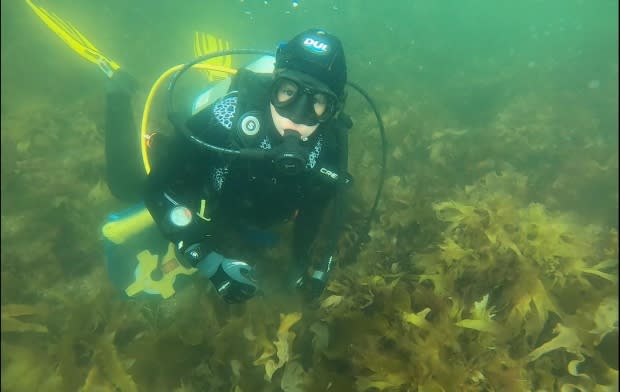Nautical archaeologists searching for shipwrecks off Gaspé coast
Montreal-born Carolyn Kennedy learned to fish from her grandfather, a lifelong sailor who left the Gaspé in his teens, but who fostered a love of the region and the water in his granddaughter.
Now a nautical archaeologist at the Institute of Nautical Archaeology in Texas, Kennedy is wrapping up a two-week trip to the Gaspé to search for sunken ships.
She and her partner Chris Dostal — guided by local fisherman Rocky Annett — have been dragging remote sensing equipment off the back of their boat to detect iron anomalies on the sea floor.
In just a couple weeks, they found a wooden structure with iron nails, which they believe may be part of a shipwreck.
"We came here to start what we hope will be a long-term project studying the shipwrecks of Gaspé," Kennedy told Quebec AM. "We're hoping that eventually we can do more of the bay."
The researcher said there is a difference between what they are expecting and what is possible. She expects they will find mostly fishing boats from the 1800s and 1900s, the type of ship most frequently seen in those waters.
"The more common the ship, the more likely there were a couple of shipwrecks," she said.
But she added that what is possible — and what she hopes — to find are European ships, from Spain, Portugal, and France, dating as far back as the 1500s, from when they would have had to navigate the Gaspé Peninsula to make their way inland into the St. Lawrence River.
"Any and all of those would be of interest to us," she said.

Kennedy said she does not want to loot or raise any of the ships she may find. She is less interested in the contents of the ships, and more invested in the construction of the ships themselves.
"We're here to really study the history of these shipwrecks," she said, adding that until about 100 years ago, ships were the "embodiment of most advanced technology that a culture had at the time" much in the way space crafts are now.
Making the dives more difficult is that the bay has a high tide, shifting sand, and cold water, not to mention the fishing nets that have been dragged along the sea floor for years, potentially damaging any artifacts, Kennedy said.
The Institute of Nautical Archaeology has active projects all over the world, from researching ancient ships in the Mediterranean to more recent ones at the bottom of inland lakes and rivers in North America.
What sets Kennedy's research apart is that most ongoing projects involve ships that have already been found, especially thanks to locals who already know where they are. The Gaspé divers hope to locate wrecks that haven't yet been identified.

